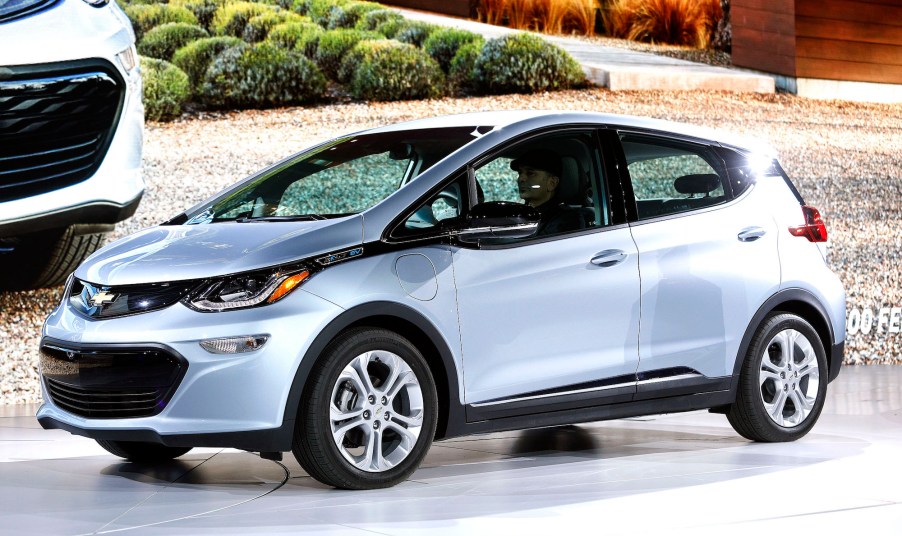
A Chevy Bolt Owner Is Filing a Lawsuit Over … Range Anxiety?
In November 2020, Chevrolet issued a recall for over 51,000 2017-to-2019 Bolt EVs. With good reason. The battery packs might catch fire, which is generally not something you want when you’re driving to the store. So far, fires have occurred only in parked cars that are, thankfully, unoccupied. Still, that’s not really what most people are looking for in a car.
In October, the National Highway Traffic Safety Administration opened an investigation after five vehicle fires were tied to the vehicles’ batteries, Consumer Reports reported. Then along came a lawsuit.
Chevy’s fix for the Bolt
Chevrolet is still working on a more permanent fix, but for now, because the cars that caught fire had batteries that were either fully charged or close, the automaker is implementing software to reduce the maximum charge of the battery to 90 percent. It hopes to have a permanent fix in early 2021, at which point batteries will again be able to charge fully.
One man’s Bolt lawsuit
Outside of the movies, you’re not surprised to hear about lawsuits when cars burst into flames. This time is no different, except for one small detail.
The person who filed the class-action lawsuit doesn’t own a Chevy Bolt that caught fire. He’s suing because his Bolt’s range is “drastically less” than before the battery charge limitation took effect, CarComplaints.com reports. The change has supposedly given him “range anxiety,” a condition that causes him stress over his Bolt’s driving distance on a single charge.
Chevy’s fix has reduced the Bolt’s estimated range from 238 to 214 miles. The plaintiff, Illinois resident Andres Torres, is now concerned he’ll be unable to get to and from work on a single charge and use the car’s heater because it drains the Bolt’s battery faster. Previously, he was able to travel round-trip for work while using the heater on a single charge.
He also claims he was not told about the battery’s potential to catch fire when he bought the car in 2019 — although the investigation did not begin until late 2020 and only one complaint was filed in 2019. He says he was also not explicitly told the software update would reduce the battery capacity and range. Apparently, the recall informing owners about reducing the battery charge to 90 percent was not explicit enough.
What the heck is range anxiety?
Worrying about your car battery dying is reasonable. It’s probably similar to stressing about running out of gas. The interesting thing about this case is that the owner previously didn’t have so-called range anxiety. But now that Chevy has reduced the Bolt’s range by 24 miles, he’s anxious. Even more baffling is that there are three ways to charge the Bolt’s battery, one of which is by plugging it into a regular wall outlet. Admittedly, this option won’t charge a battery quickly, but there are over 40,000 charging stations in the United States.
The class-action lawsuit, filed in the U.S. District Court for the Northern District of Illinois, also claims Chevy’s parent company, General Motors, overstated the battery’s capacity in advertising and knew about the batteries’ problems since 2017 but hid that fact from consumers.
The Illinois case has spawned other proposed class-action suits, including two in Michigan, ClassAction.org reports. The plaintiffs in those two cases are from Arizona, Washington, and California. They filed in Michigan because GM is headquartered in that state.
Each lawsuit is asking for a minimum of $5 million in damages, to include, among other things, punitive damages, restitution, and replacement, repair, or refund of purchased vehicles. It will be interesting to see how these play out and if other cases will pop up.
If you own an affected 2017, 2018, or 2019 Chevy Bolt and would like more information about these class-action lawsuits, contact the law firms representing the plaintiffs. For the Illinois lawsuit — Torres et al. v. General Motors LLC — contact Barnow and Associates PC, Chimicles Schwartz Kriner & Donaldson-Smith LLP, or Wittels McInturff Palikovic. The plaintiffs in the two Michigan class actions — Rankin et al. v. General Motors LLC and Altobelli and Andersen et al. v. General Motors LLC — are represented by separate legal parties. Contact The Miller Law Firm PC or Migliaccio & Rathod LLP for the Rankin lawsuit, and reach out to Keller Rohrback LLP or The Miller Law Firm PC for the Altobelli/Andersen lawsuit.


